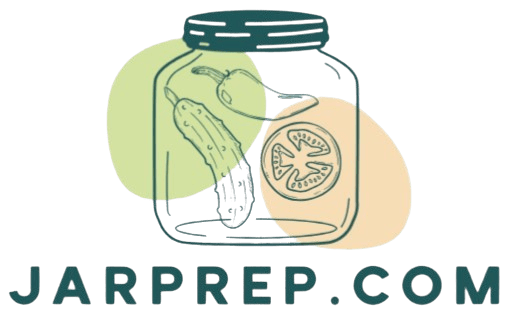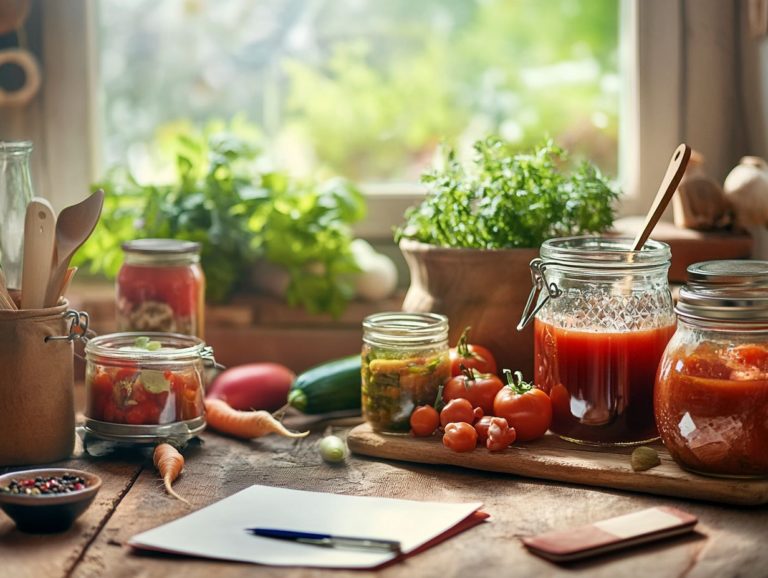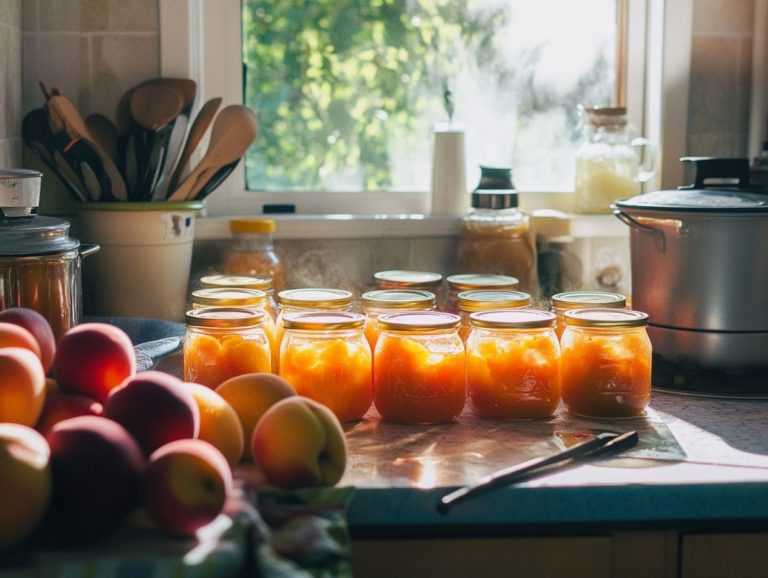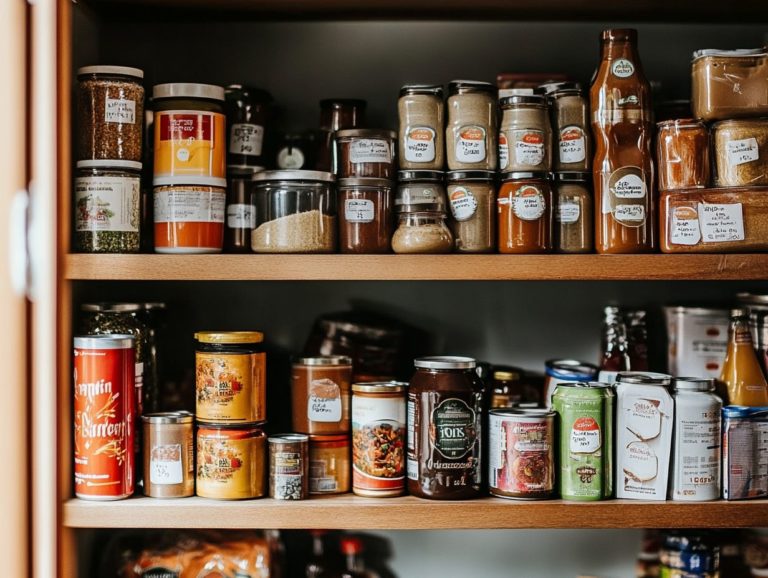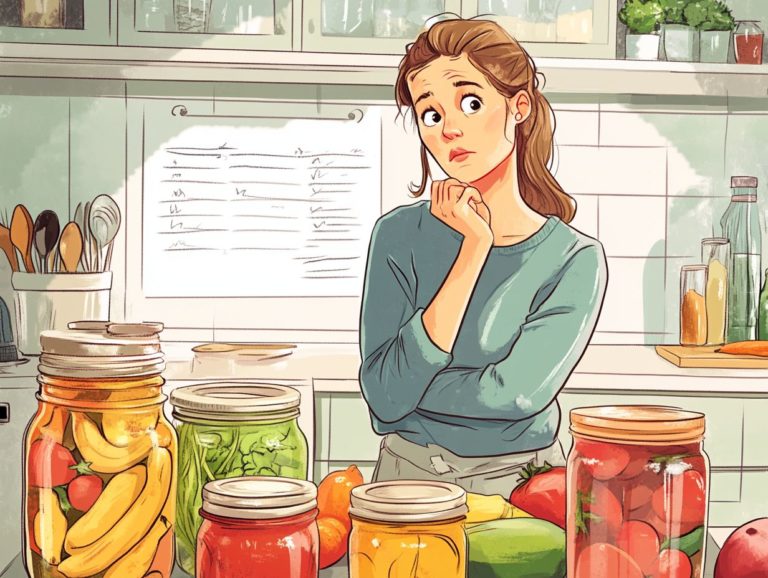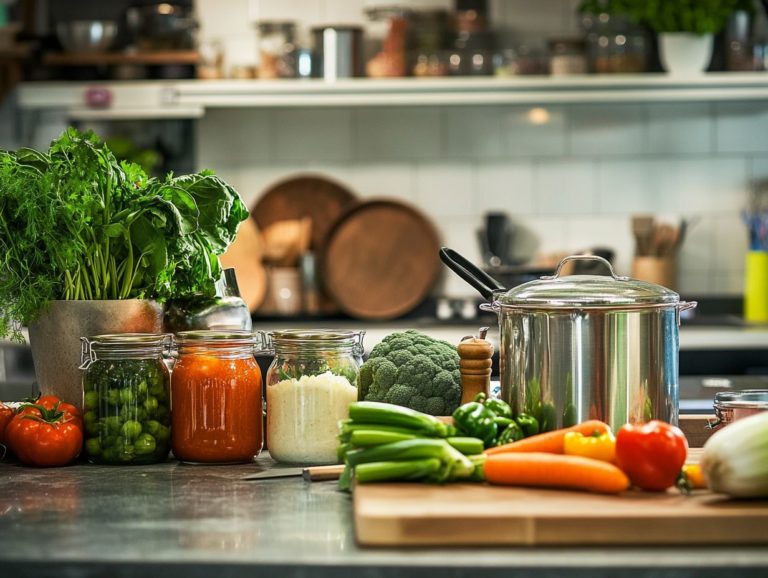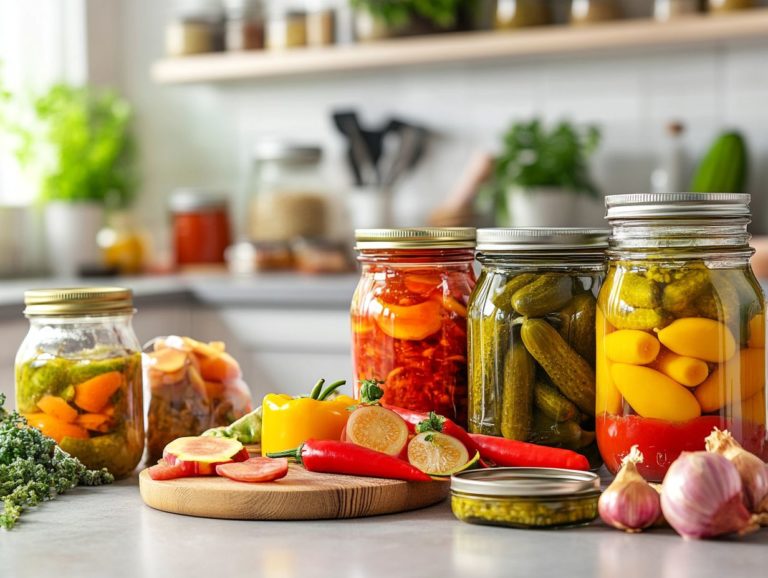Do I Need Special Jars for Canning?
Canning is a timeless technique for preserving food, and you might be asking yourself if special jars are really necessary for the process.
This guide highlights the benefits of specialized jars and explores alternatives. It delves into the various types of canning jars available, offering a comparison of materials while discussing key considerations such as size, sealing mechanisms, and cost, particularly focusing on the advantages of using a canning pot.
It underscores the advantages of using specialized jars while also exploring alternatives, including standard jars and other preservation methods.
Whether you re an experienced canner or a curious newcomer, this information will empower you to make informed decisions!
Contents
Key Takeaways:
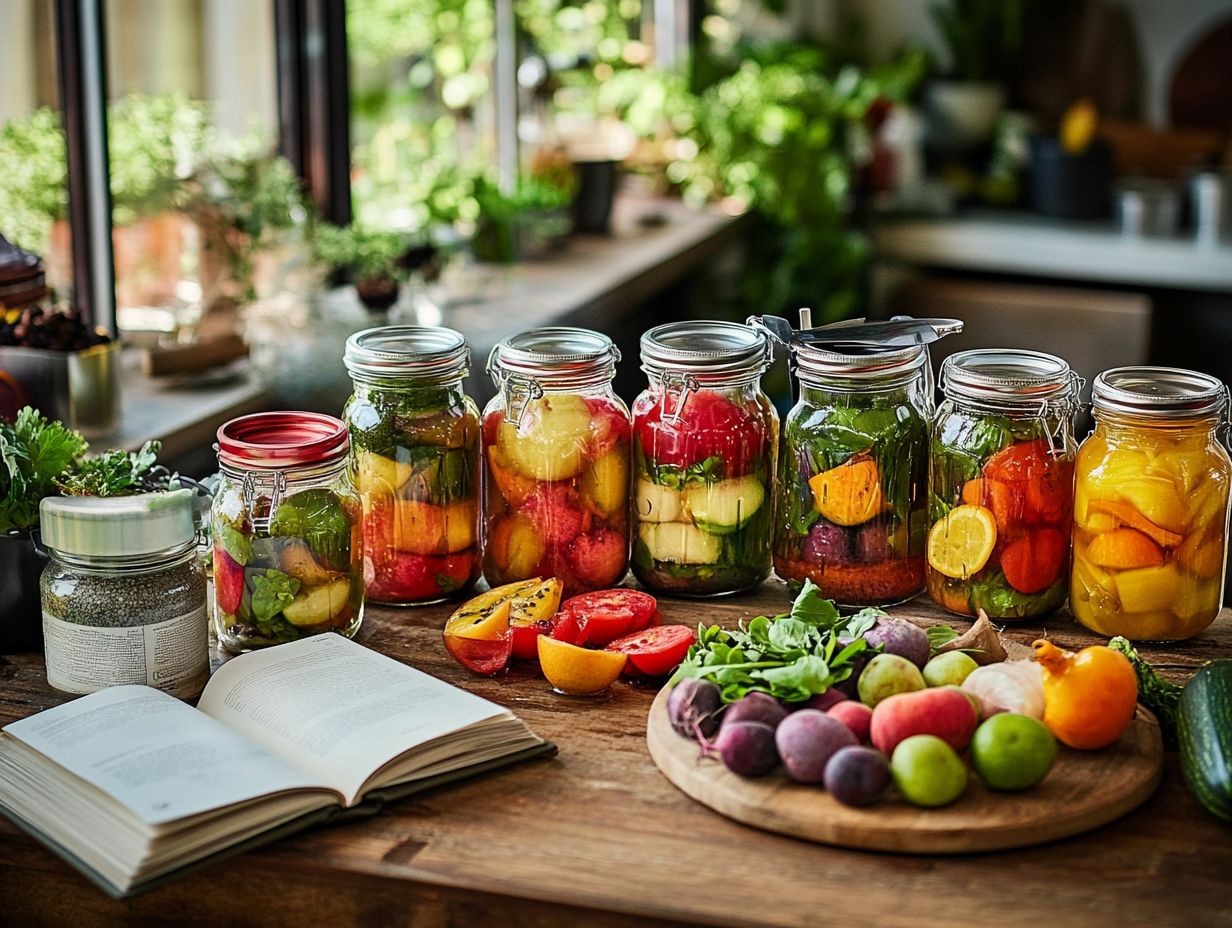
- Special canning jars are designed specifically for preserving food through the canning process, providing airtight seals and ensuring food quality and safety.
- Factors to consider when choosing canning jars include size, sealing mechanisms, and price and availability.
- While regular jars can be used for canning, they do not offer the same level of preservation and safety as special canning jars. Other preservation methods may also be used as alternatives.
Understanding Canning
Canning is an art of food preservation that gives you the power to store fruits, vegetables, jams, and jellies by sealing them in jars or containers. This process extends the shelf life of your food and locks in essential nutrients and vibrant flavors!
It also ensures safety through techniques like boiling water canning or pressure canning.
The origins of canning date back to the early 19th century, crafted to provide sustenance for soldiers and those embarking on long voyages. Over the years, methods such as water bath and pressure canning have evolved, tailored to various types of foods, particularly when considering safety implications based on acidity levels.
For enthusiasts like you, it s crucial to follow established safety protocols, which include cleaning jars and relying on trustworthy recipes for successful food preservation. This diligence minimizes the risk of botulism or spoilage, allowing you to preserve with confidence.
By mastering these canning techniques, such as understanding proper headspace, you unlock a treasure trove of creative preservation recipes, ranging from tangy pickles to sumptuous fruit syrups.
Not only does this endeavor prove practical, but it also offers a delightful way to enjoy seasonal flavors throughout the year.
Types of Canning Jars
In the realm of canning, choosing the right type of jar, such as a Mason jar or a Ball Canning jar, is essential for achieving successful food preservation. Consider options such as Mason jars, Ball Canning jars, and other glass varieties; each offers its unique features and benefits tailored to meet your specific canning needs.
Comparison of Different Materials
When you’re comparing materials for canning jars, glass jars often come out on top for their durability and do not react with the food, making them ideal for high-acid foods. Meanwhile, stainless steel pots are essential for boiling water or pressure canning, thanks to their ability to endure high temperatures.
Each of these materials offers its unique set of advantages and disadvantages. Glass jars, for example, let you easily monitor the food inside and won t leach chemicals, making them a go-to for home canners. However, they can be a bit fragile and susceptible to breakage, especially when exposed to sudden temperature changes.
Conversely, stainless steel options are incredibly robust and resistant to thermal shock, but they may react with acidic foods if not adequately coated.
To elevate your canning experience, kitchen tools like silicone trivets, jar lifters, and pressure vessels are crucial. They ensure safe handling and help maintain optimal pressure levels for effective preservation, ultimately leading to quality results that you can be proud of!
Factors to Consider When Choosing Canning Jars
When selecting the perfect canning jar, consider several essential factors: size and capacity, sealing mechanisms, price, and availability. Each of these elements plays a crucial role in optimizing your canning workflow and ensuring your success in preserving food.
Making informed choices will enhance your efficiency and the longevity of your preserved creations.
Size and Capacity
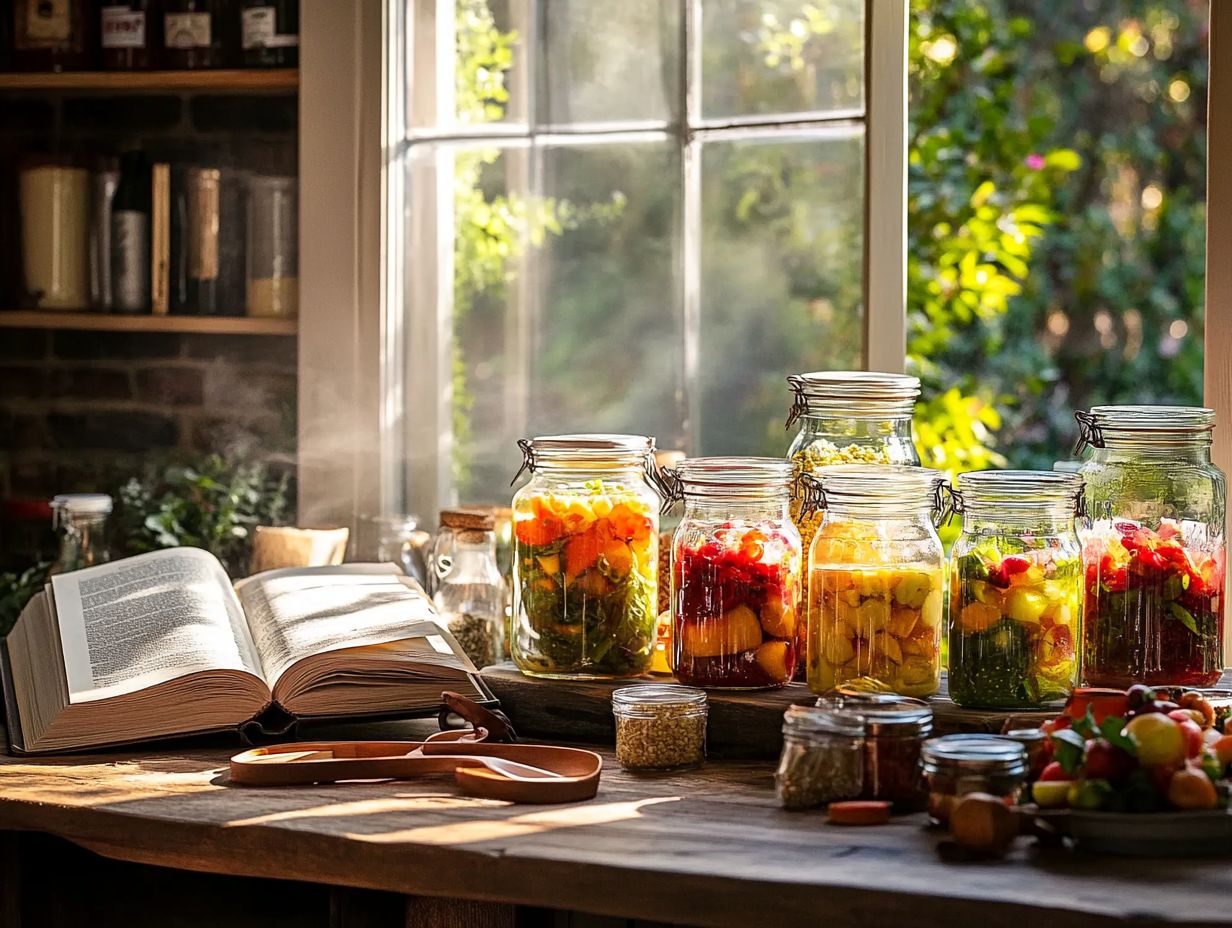
When selecting canning jars, it s essential to understand their size and capacity. Larger jars are ideal for bulk storage, while smaller ones shine for single servings or gifting.
Choosing the right jar size is vital for keeping your delicious preserves fresh and flavorful! It optimizes the balance of flavors, particularly for items like preserves and jams.
For example, when canning fruits, you should leave about an inch of headspace the space left at the top of the jar to allow for expansion and ensure a proper seal. This space lets gases escape during heating, preventing jar breakage and spoilage.
Understanding these nuances is important if you’re new to canning. Using a jar that’s too large might waste space and compromise quality, while one that’s too small could disrupt the preservation process entirely.
Sealing Mechanisms
Understanding the different sealing mechanisms for canning jars is crucial for ensuring food safety. Options range from traditional metal sealing lids to reusable lids, each designed to create an airtight seal.
These mechanisms protect against spoilage and maintain the flavor and nutritional value of your home-preserved foods. Metal lids, often paired with a rubber gasket, are popular due to their ease of use and reliable sealing properties.
Reusable lids offer an eco-friendly alternative, allowing you to contribute to sustainability while ensuring a secure seal. By understanding the pros and cons of these methods, you can make informed decisions about your preserving practices.
Price and Availability
The price and availability of canning jars can fluctuate, with well-known brands like Mason and Ball Canning often more accessible at local stores and online. However, they can come with a premium price tag.
This variation in cost can sway your decisions, especially if you re just starting in the world of canning or trying to stick to a budget.
If you re a novice canner, you might consider experimenting with more affordable brands. However, investing in quality jars is often worth it for long-term benefits.
Having access to budget-friendly options encourages more people to try canning, creating a lively community eager to exchange tips and recipes. Ultimately, finding the right balance between quality and cost is crucial for every canner.
Benefits of Using Special Canning Jars
Utilizing specialized canning jars offers numerous advantages, including improved food quality and heightened safety during the preservation process.
This approach extends shelf life, particularly for high-acid foods, while elevating the efficiency and reliability of your food storage efforts.
Start using specialized jars right away for the best results!
Preserving Food Quality
One of the primary advantages of using specialized canning jars is their ability to effectively preserve food quality. This is especially true for high-acid foods like fruits and jams, as well as for low-acid varieties that require precise canning techniques.
Selecting the right type of jar can profoundly impact the taste, texture, and shelf life of your preserved items. Glass jars are often favored for their non-reactive properties. These properties help retain certain flavors and prevent chemical reactions that could jeopardize food safety.
It s essential to consider the size and shape of the jars you choose. Smaller jars are perfect for single-serving portions, while larger ones accommodate bulk preserves nicely. Using the right lids and ensuring a proper seal is important, as this significantly contributes to retaining freshness over time.
This attention to detail enhances the canning process, making it more effective and enjoyable.
Ensuring Safety
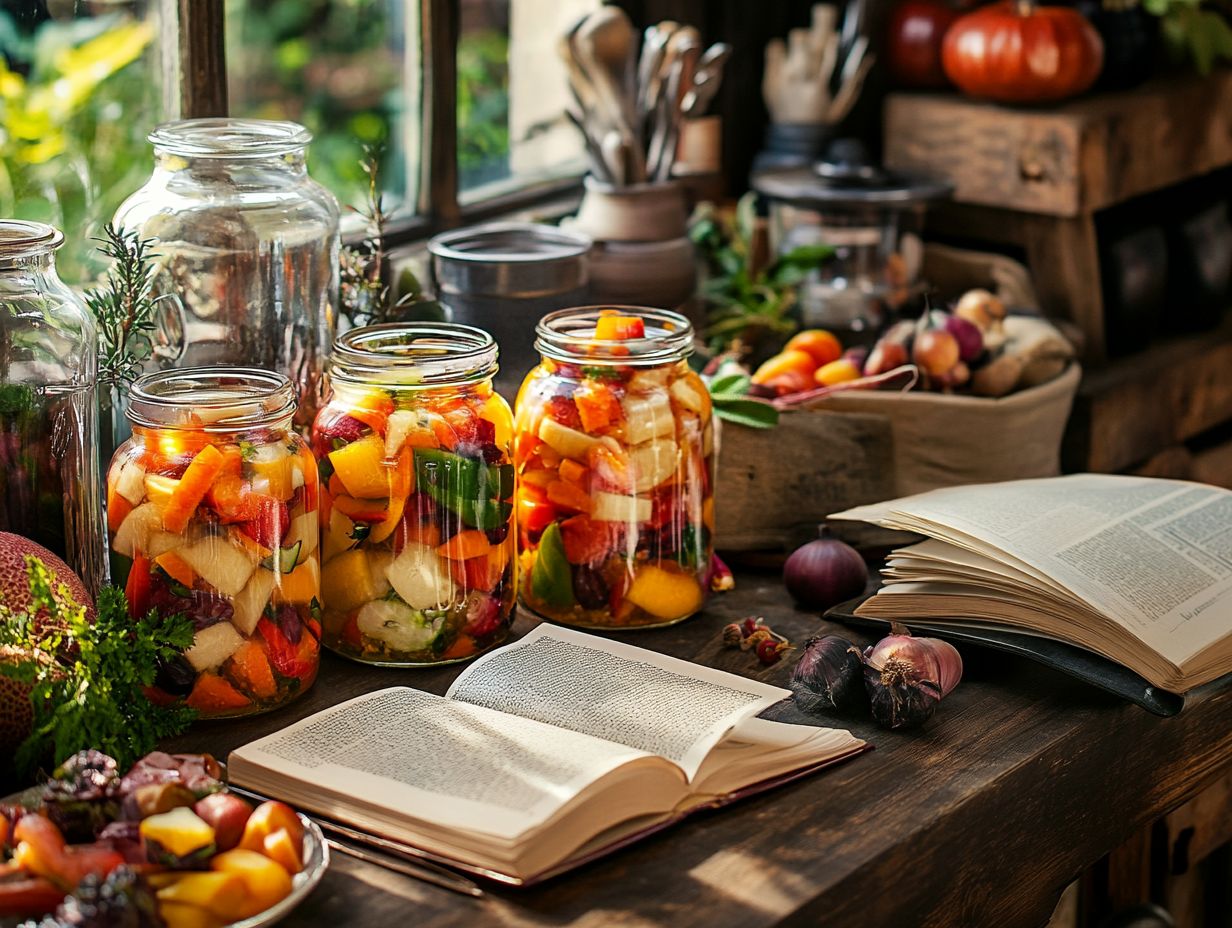
Ensuring food safety during the canning process is crucial. Using proper sealing lids and following recommended processing times are essential safety tips that can prevent spoilage and shield against foodborne illnesses.
Choosing the right type of canning jars is vital. Inspect them for any chips or cracks, as damaged jars can compromise seals and lead to contamination, especially during processing. Processing times can vary based on the food type. High-acid foods like tomatoes require less time than low-acid foods like green beans, which also need proper lid instructions for sealing.
To bolster safety, avoid common mistakes. For example, don t overfill jars, which can disrupt sealing. Avoid relying on outdated recipes that may not guarantee necessary acidity levels. Follow these best practices to ensure your preserves are safe and delicious!
Other Options for Canning
While special canning jars are recommended for their unique properties, understanding the different types of canning jars shows that there are also viable alternatives available.
Regular jars can be effectively employed for canning and other food preservation methods when specialized equipment isn’t available, but knowing what the essentials for canning kits are can greatly enhance the process.
Using Regular Jars for Canning
Using regular jars for canning can be a clever alternative if specialized jars aren’t within reach. Just make sure to apply the right canning techniques for effective food storage.
To make the most of your jars, inspect them for any cracks or chips that could compromise their integrity. Thoroughly cleaning your jars before use is essential; this simple step can prevent contamination and help preserve the quality of your stored food.
When sealing, remember to leave the recommended headspace, which is the gap between the food and the lid of the jar. This gap allows for proper vacuum sealing, which is vital for maintaining freshness.
Using a boiling water bath or a pressure canner, depending on the type of food you re preserving, enhances safety and minimizes the risk of spoilage and bacterial growth. By following these best practices, you can confidently turn regular jars into a reliable option for your home canning endeavors.
Other Preservation Methods
Aside from canning, you have a world of effective food preservation methods at your fingertips, such as pickling with vinegar, freezing, and dehydrating. Each method has its own benefits for different foods.
These methods are fantastic for those wanting to spice up their food storage! For example, freezing captures that fresh taste without resorting to chemicals, preserving fruits and vegetables at their prime.
Dehydrating takes out moisture, making lightweight snacks that are still nutritious.
Pickling also extends shelf life and adds exciting flavors, elevating your enjoyment of seasonal produce. This lets you tailor your food preservation to your lifestyle!
Frequently Asked Questions
Want to know if you need special jars for canning?
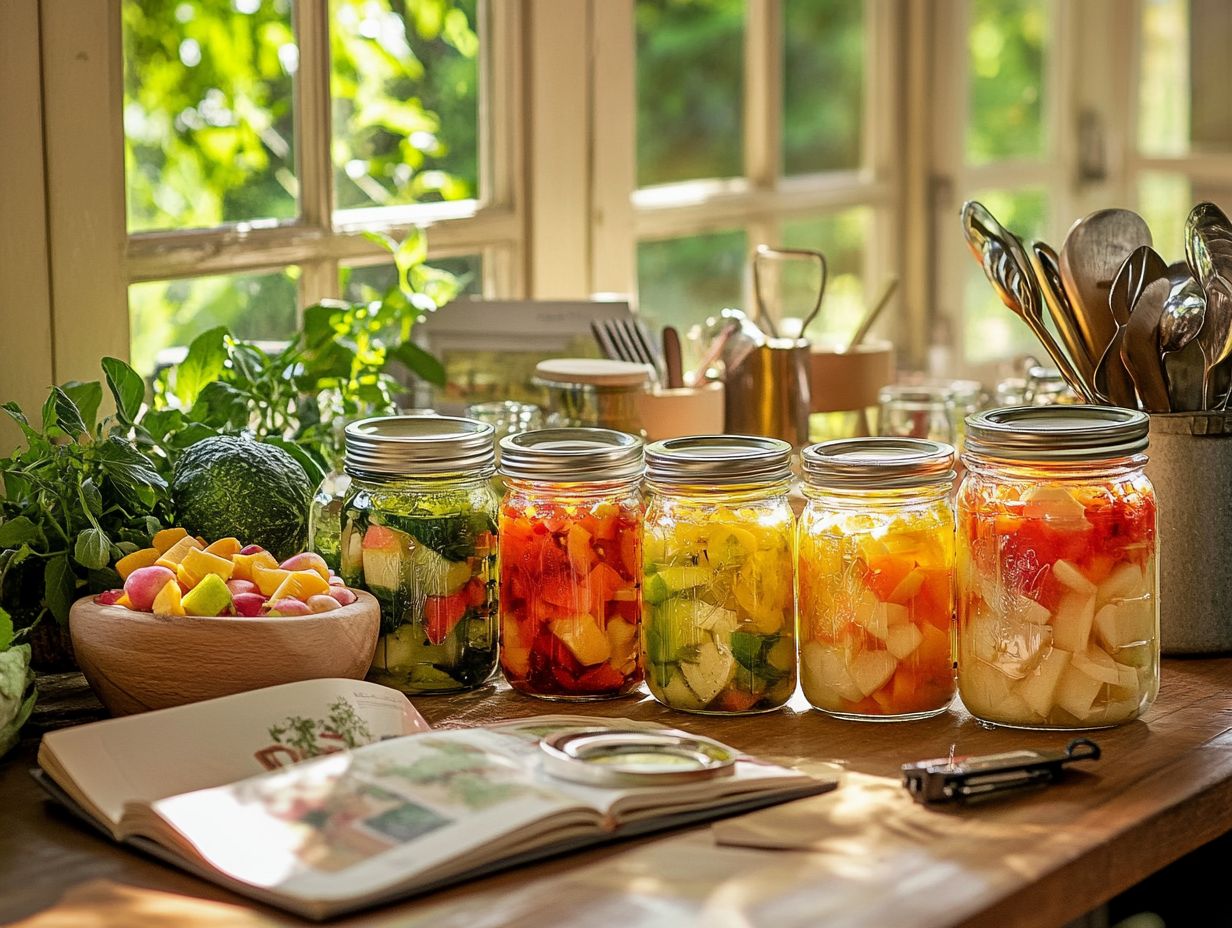
Yes, you will need special jars for canning. Regular jars are not designed to withstand the high temperatures and pressure involved in the canning process, so it’s important to learn about picking the right jars for canning.
What type of jars should I use for canning?
Use Mason jars, also called canning jars, as they are made specifically for canning and have been tested to withstand the heat and pressure. To learn more about using them properly, check out our guide on how to prepare jars for canning.
Can I reuse jars for canning?
No, it is not safe to reuse jars for canning. Jars that have been previously used may have microcracks or imperfections that can lead to contamination or breakage during the canning process.
Why can’t I use regular jars for canning?
Regular jars for jelly or pasta sauce can’t handle high heat and pressure. Using them can result in broken jars, spoiled food, and potential health hazards.
What size jars should I use for canning?
The size of the jars for canning depends on the type of food you are preserving. It is recommended to use pint or quart-sized jars, as these are the most common and provide the best results.
Do I need to use new jars for every batch of canning?
Yes, it is best to use new jars for every batch of canning. Reusing jars can increase the risk of contamination and decrease the likelihood of a successful canning process. Always use clean, undamaged jars for canning.
